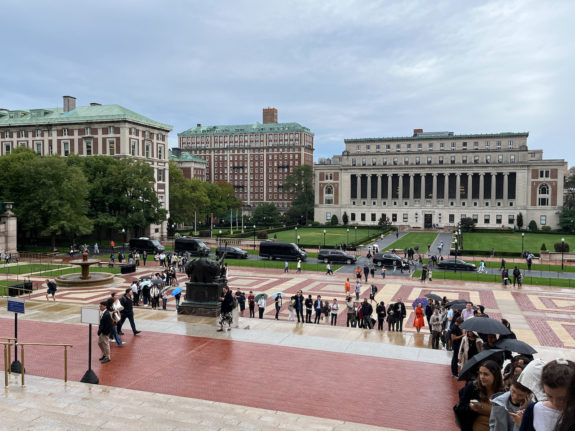For the final event of the World Leader’s Forum, Chilean President Gabriel Boric discussed his rise to the presidency, the recent Chilean constitutional referendum, and the role and responsibilities of the Left in Latin America, in a conversation moderated by Maria Victoria Murillo.
President Boric, of Chile, got his start in politics as a student leader, and is the youngest state leader in the world right now at 36. Perhaps that’s why so many Columbia students turned out to see him on this wet and windy Thursday, lining up all the way from Low Plaza back onto College Walk.

Boric’s first reflections on politics, he said, came when he was about 12. His family is from the south of Chile, from Punta Arenas, which “is really far away from everywhere. It’s closest to Antarctica.” But despite this isolation, he realized that Chileans have a history in common, and “it’s about suffering.” He spoke of a protest outside the presidential palace of La Moneda, where the protestors were demanding to know where their families were—people who were disappeared during the dictatorship and whose fate was still unknown. When that was explained to him, Boric said, he started to feel that something was wrong, and began to read up on the history of Chile to better understand it.
Part of that education in politics, he said, was realizing there’s no way to change things but to commit to them—and that commitment can’t be an individual effort, but must be a collective one. At university, he realized that being radical wasn’t equal to “screaming or saying a lot of adjectives,” but bringing many people together, in support of a common cause.
When he was asked later about becoming president by some of the students present, he said that the first step was that “you don’t wish to be president of Chile”—that it’s not about ambition, but going slow and being able to work with your partners in the endeavor. About his youth: while there’s no intrinsic value in youth, he said, the larger problem is that generations don’t talk to each other. It’s a mistake to think that politics “begins with us” and we should read a lot of history; but the young especially should work to push the fence, to carve out a space in politics for ourselves without first asking for permission.
Going slow(er) was also a theme Boric talked about regarding the recent Chilean constitutional plebiscite. During massive social unrest in 2019, Chileans negotiated a referendum to update the constitution, which was written during the Pinochet dictatorship, and approved a constitutional assembly in 2020 to change it. However, on September 4, the progressive constitution which emerged from that assembly was rejected, 62% to 38%. Boric called the result a “humbler” of sorts for people who supported the new constitution—he voted for it, he said. After all, people want change—they voted to change the constitution—but they want to change with certainty, without big changes “from night to day.”
The proponents of the new constitution, he said, thought that at one time they could go faster without bringing everybody with them. Yet, “for big changes you need big majorities…and you need to build big majorities,” not just hope they follow.
Part of this involves recognizing the everyday challenges people face, and working to address them as well. “I’m a leftist,” he told us, “I’m not afraid of saying it, but people on the left have to understand that the promises of a better world, way ahead, won’t bring safety, certainty, better quality of life, if we don’t work hard on management also. We have to find a balance between the big structural reforms…and the day-to-day life.” And that’s part of the responsibility of left parties around the world: not just to talk about the large-scale roots of problems, but to be able to give answers in the moment to people seeking them. He reiterated that these approaches don’t mean left parties or his administration should forget or abandon the mandate they entered office with—a mandate of change—but that “I don’t feel we’re going the wrong way if we’re going slower.”
This balance, between grand change and quotidian life, in staying humble while seeking broad coalitions, was a core part of how Boric spoke about democracy as well. He led with a French quote: “in politics, doubt should follow your convictions like a shadow”; to do otherwise, he said, to never question your convictions, makes you fanatic. “We’ve seen fanatics,” he said. “You’ve seen fanatics, here in the States—the last President…”
Another part of the left’s responsibilities in governing, he said, was respect for human rights everywhere. “It really pisses me off,” he said when you’re from the left and you condemn the violation of human rights in Yemen or El Salvador, but you cannot talk about Venezuela or Nicaragua.” There can be no double standard of who is criticized and who is not—there must be “just one moral standard.”
Photos via Charlie Bonkowsky


 0 Comments
0 Comments